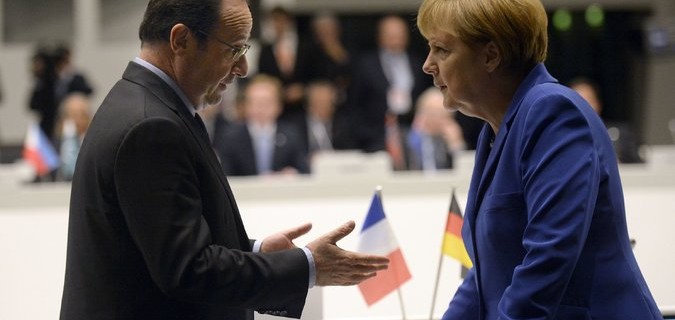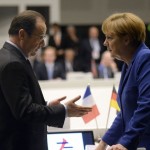German Economic Growth Accelerates, French GDP Only Slightly Higher

[Previously published as “French Economy Grew Only Slightly in Fourth Quarter” article updated by WSJ.]
The eurozone’s largest economies were on diverging paths in the final three months of 2014, as German growth accelerated, France slid closer to stagnation and Italy recorded its 14th straight quarter without a rise in output.
Gross domestic product in Germany—the currency area’s largest economy—was 0.7% higher in the fourth quarter than the third, the national statistics agency De Statis reported Friday. That marked a significant pickup from the 0.1% expansion recorded by Germany in the three months to September.
By contrast, France’s economic growth—the eurozone’s second largest—slowed during the three months to December. Output edged 0.1% higher, having risen by 0.3% in the third quarter, the national statistics agency Insee reported.
Italy’s economic output was unchanged on the quarter, while its gross domestic product fell 0.4% during 2014 as a whole, having declined by 1.9% in 2013. It was the third year of contraction for the eurozone’s third-largest economy.
Previously released figures showed Spain’s economy grew more rapidly, while the Netherlands on Friday also reported a pickup in growth, to 0.5% from 0.1% in the third quarter. They are, respectively, the fourth and fifth largest eurozone economies. Slovakia recorded an unchanged 0.6% rate of growth.
In 2014 as a whole, the French economy expanded by just 0.4%, matching the growth rate in 2013. The economy has been largely stagnant for years, bedeviling President François Hollande ’s efforts to encourage hiring by cutting corporate taxes.
The eurozone economy returned to growth in the second quarter of 2013, having contracted for the previous six quarters. But quarter-to-quarter growth has remained weak, leaving the jobless rate close to its record high, and making it difficult for governments and households to reduce high levels of debt.
With the economy barely avoiding stagnation and consumer prices in decline, the European Central Bank will next month launch a new stimulus program under which it will buy more than €1 trillion ($1.13 trillion) of mostly government bonds by September 2016.
While some recent economic data indicate that the fall in oil prices may be delivering a boost to parts of the economy, policy makers worry that the currency area is at risk of a slide into deflation, or a situation in which consumers and businesses cut back on spending because they expect prices to fall further, the outcome being a decline in output and employment that pushes prices even lower. They also worry that fresh doubts about Greece’s ability to remain inside the currency area will damage already-weak business and investor confidence.
Consumer spending, which makes up around two-thirds of France’s GDP, contracted sharply at the start of 2014, and did so again in the fourth quarter, falling by 1.5%.
MARKET TALK
France Gets GDP Fest Off to Weak Start We’re off to a pretty feeble start, with France’s statistics agency recording a 0.1% increase in gross domestic product over the final three months of the year. In the whole of 2014, the economy expanded by just 0.4%, matching the weak 2013 performance. In other words, the French economy continues to stagnate, and since it is the second-largest member of the eurozone, that’s a problem for the currency area as a whole.The paralysis is most apparent in the country’s lackluster consumer spending, which is supposed to be the engine of France’s economy. One bright spot in the French data: Exports. A weakening euro helped lift exports by 2.3% in the final three months of the year. (paul.hannon@wsj.com)
German GDP Shines Brighter Than Anticipated German GDP comes in better than expected, up 0.7% on the quarter and 1.4% on the year. There was “considerably more” capital spending, particularly on equipment, machinery and construction, versus the third quarter, the German statistics agency said. In an on-year comparison, household consumption was a “notable” support, it added. Analysts had a expected a 0.3% rise on the quarter and an increase of 1.0% versus the fourth quarter of 2013. For all of 2014, the economy expanded 1.6%, slightly better than the agency’s preliminary estimate of 1.5% in January. (nikki.houston@wsj.com)
Market Talk is a stream of real-time news and market analysis that’s available on Dow Jones Newswires.
Investment by nonfinancial companies—a closely watched component of GDP—dropped 0.2% in the fourth quarter but rose 0.3% overall in 2014.
France’s fourth-quarter performance was “weak,” Finance Minister Michel Sapin told news channel I-Tele. But he said there were no changes in the government’s forecast of 1% growth for 2015, adding that such an increase would amount to “more than double” the 0.4% growth France clocked in 2014.
Creating real momentum, Mr. Sapin said, depended on whether French firms were willing to start putting some skin in the game.
“What’s lacking in France and Europe? Investment,” he said, describing meager outlays as “a big cause of unemployment.”
France’s anemic economic output in 2014 is likely to frustrate the French government’s efforts to bring down its budget deficit. Figures last week showed that the central state’s budget alone—which doesn’t include local authorities and social security—rose in 2014 as tax receipts fell short of official expectations.
The overall deficit will rise to 4.4% of economic output this year from 4.1% last year and won’t fall within the European Union’s 3% target until 2017, according to the latest government forecasts.
Still, economists expect growth to pick up at the start of this year as the benefits of lower oil prices feed into the economy. Mr. Hollande’s tax credit for employers also came into full force at the start of this year and exporters are expected to benefit from a weaker euro, which makes their goods more competitive in global markets.
The eurozone’s long slump has weighed on economies with which it has close trading and financial links. Most of those economies slowed in the final quarter, including Poland, the Czech Republic, Romania and Bulgaria.
Hungary is also one of nine members of the European Union that don’t use the euro, and its economic growth accelerated to 0.9% in the fourth quarter on car industry exports, agricultural output, and tourism. In the whole of 2014, Hungary’s GDP increased 3.5% from 2013, significantly faster than the government’s upwardly revised 3.1% forecast.
Source: WSJ – German Economic Growth Accelerates, French GDP Only Slightly Higher





























